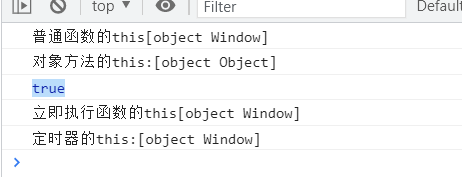Js中this指向
我们在初使用 JavaScript 开发的时候,多多少少会被 this 的指向搞蒙圈,弄不清楚this指向哪一个对象,但是实际上,关于 this 的指向,记住最核心的一句话:
哪个对象调用函数,函数里面的this指向哪个对象。
对this的讨论,主要分以下几种情况:
一、普通函数调用

二、对象函数调用
2.对象的方法 this指向的是对象 o
var o = {
sayHi: function() {
console.log('对象方法的this:' + this);
}
}
o.sayHi(); //this指向的是对象 o
三、构造函数调用
3. 构造函数 this 指向 ldh 这个实例对象 原型对象里面的this 指向的也是 ldh这个实例对象.

四、定时器函数调用与立即执行函数调用
// 5. 定时器函数 this 指向的也是window window.setTimeout(function() { console.log('定时器的this:' + this); }, 1000); // 6. 立即执行函数 this还是指向window (function() { console.log('立即执行函数的this' + this); })();
五、ES6中箭头函数的调用
箭头函数不绑定this即箭头函数没有自己的this,如果在箭头函数中使用this,this关键字将指向箭头函数中定义位置中的this
function fu() { console.log(this); return () => { console.log(this); } } const obj = { name: '张三', age: 20 } const resfn = fu.call(obj) resfn()
效果如下:

六、call()和apply()与bind()调用
<script>
var o = {
name: 'andy',
}
function fu(a, b) {
console.log(this);
console.log(a + b);
}
fu.call(o, 1, 2);
// call 第一个可以调用函数 第二个可以改变函数内的this 指向
// call 的主要作用可以实现继承
function Father(uname, age, sex) {
this.uname = uname;
this.age = age;
this.sex = sex;
}
function Son(uname, age, sex) {
Father.call(this, uname, age, sex);
}
var son = new Son('刘德华', 18, '男');
console.log(son);
</script>
效果图如下:

6.2apply()也是可以调用函数 ,第二个作用也可以改变函数内部的this指向,但是apply()的第二个参数必须是数组(伪数组)
// 2. apply() 应用 运用的意思 var o = { name: 'andy' } function fu(arr) { console.log(this); console.log(arr); //打印的是字符串 } fu.apply(o, ['pink']); // 1. 也是调用函数 第二个可以改变函数内部的this指向 // 2. 但是他的参数必须是数组(伪数组) // 3. apply 的主要应用 比如说我们可以利用 apply 借助于数学内置对象求数组最大值 // Math.max(); var arr = [1, 66, 3, 99, 4]; var max = Math.max.apply(Math, arr); var min = Math.min.apply(Math, arr); console.log(max, min);
效果如下:

6.3 bind()不会调用原来的函数 ,但是可以改变原来函数内部的this 指向,调用该函数是有返回值的,返回的是原函数改变this之后产生的新函数
var o = { name: 'andy' }; function fn(a, b) { console.log(this); console.log(a + b); }; var f = fn.bind(o, 1, 2); f();
效果如下:

bind函数用的较多,如果有的函数我们不需要立即调用,但是又想改变这个函数内部的this指向此时用bind,比如我们有一个按钮,当我们点击了之后,就禁用这个按钮,3秒钟之后开启这个按钮(类似于60s发送短信验证)
var btn = document.querySelector("button"); btn.onclick = function() { // var that = this; this.disabled = true; // 这个this 指向的是 btn 这个按钮 setTimeout(function() { // that.disabled = false;定时器函数里面的this 指向的是window this.disabled = false; // 此时定时器函数里面的this 指向的是btn }.bind(this), 3000) // 这个this 指向的是btn 这个对象 }
七、call()和apply()与bind()总结
相同点:都可以改变this指向
不同点: call 和 apply 会调用函数, 并且改变函数内部this指向 ,call传递参数使用逗号隔开传递,apply传递第二个参数使用数组传递, bind 不会调用函数
应用场景: call 经常做继承, apply 经常跟数组有关系. 比如借助于数学对象实现数组最大值最小值 ,bind 不调用函数,但是还想改变this指向. 比如改变定时器内部的this指向
好了,关于js中this的指向问题就介绍到这里啦。如果你发现文中有错误的地方,还希望大佬们指正,共同进步



